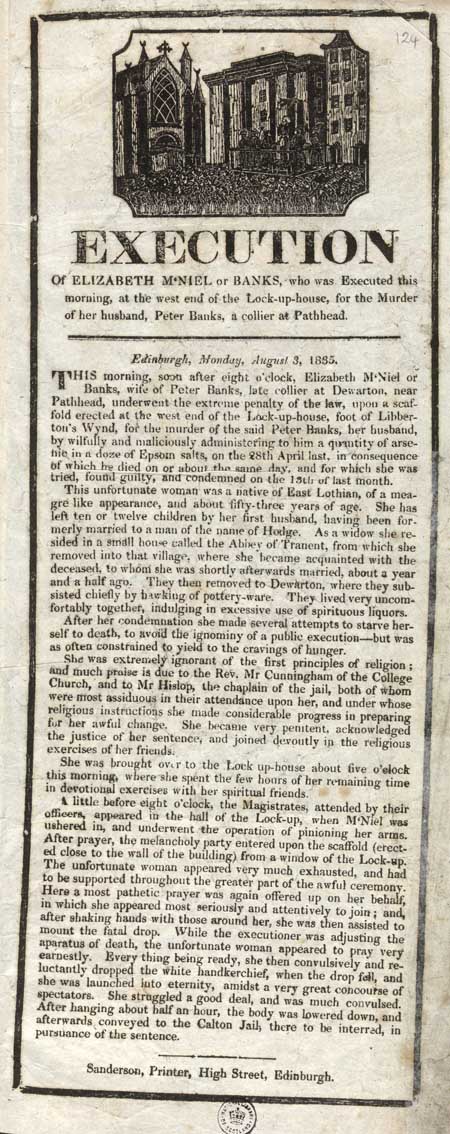Transcription
EXECUTION Of ELIZABETH M'NIEL or BANKS, who was Executed this morning, at the west end of the Lock-up-house, for the Murder of her husband, Peter Banks, a collier at Pathhead. Edinburgh, Monday, August 3, 1835. THIS morning, soon after eight o'clock, Elizabeth M'Niel or
Banks, wife of Peter Banks, late collier at Dewarton, near
Pathhead, underwent the extreme penalty of the law, upon a scaf-
fold erected at the west end of the Lock-up-house, foot of Libber-
ton's Wynd, for the murder of the said Peter Banks, her husband,
by wilfully and maliciously administering to him a quantity of arse-
nic in a doze of Epsom salts, on the 28th April last, in consequence
of which he died on or about the same day, and for which she was
tried, found guilty, and condemned on the 13th of last month. This unfortunate woman was a native of East Lothian, of a mea-
gre like appearance, and about fifty-three years of age. She has
left ten or twelve children by her first husband, having been for-
merly married to a man of the name of Hodge. As a widow she re-
sided in a small house called the Abbey of Tranent, from which she
removed into that village, where she became acquainted with the
deceased, to whom she was shortly afterwards married, about a year
and a half ago. They then removed to Dewarton, where they sub-
sisted chiefly by bawking of pottery-ware. They lived very uncorn-
fortably together, indulging in excessive use of spirituous liquors.
After her condemnation she made several attempts to starve her-
self to death, to avoid the ignominy of a public execution?but was
as often constrained to yield to the cravings of hunger.
She was extremely ignorant of the first principles of religion ;
and much praise is due to the Rev. Mr Cunningham of the College
Church, and to Mr Hislop, the chaplain of the jail, both of whom
were most assiduous in their attendance upon her, and under whose
religious instructions she made considerable progress in preparing
for her awful change. She became very penitent, acknowledged
the justice of her sentence, and joined devoutly in the religious
exercises of her friends.
She was brought over to the Lock up-house about five o'clock
this morning, where she spent the few hours of her remaining time
in devotional exercises with her spiritual friends.
A little before eight o'clock, the Magistrates, attended by their
officers, appeared in the hall of the Lock-up, when M'Niel was
ushered in, and underwent the operation of pinioning her arms.
After prayer, the melancholy party entered upon the scaffold (erect-
ed close to the wall of the building) from a window of the Lock-up.
The unfortunate woman appeared very much exhausted, and had
to be supported throughout the greater part of the awful ceremony. Here a most pathetic prayer was again offered up on her behalf,
in which she appeared most seriously and attentively to join; and,
after shaking hands with those around her, she was then assisted to
mount the fatal drop. While the executioner was adjusting the
aparatus of death, the unfortunate woman appeared to pray very
earnestly. Every thing being ready, she then convulsively and re-
luctantly dropped the white handkerchief, when the drop fell, and
she was launched into eternity, amidst a very great concourse of
spectators. She struggled a good deal, and was much convulsed.
After hanging about half an hour, the body was lowered down, and
afterwards conveyed to the Calton Jail, there to be interred, in
pursuance of the sentence. Sanderson, Printer, High Street, Edinburgh.
View Commentary | Download PDF Facsimile
|
 |
Date of publication:
1835 shelfmark: F.3.a.13(124)
 View larger image
View larger image
|


